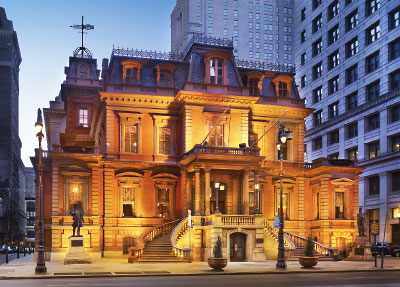APA Foundation Rolls Out Red Carpet at Historic Location for Annual Benefit
Abstract
The APA Foundation’s benefit on Saturday, April 25, at the Union League of Philadelphia embraces the history of the city while supporting the Foundation’s programs and initiatives.

Almost every lavishly decorated room in the Union League of Philadelphia is adorned with paintings, some of which are over 200 years old.
Just 17 years after the organization that would become APA was founded in Philadelphia, the country was torn apart by war, and the city, just north of the Mason-Dixon line, was divided. But in 1862, a group in Philadelphia took a decidedly pro-Union stance, founding the Union League of Philadelphia, a patriotic organization dedicated to supporting President Abraham Lincoln and the continuity of the Union. The Union League still operates as a private club today, headquartered at the stately Union House on Broad Street.
The APA Foundation will give APA members attending the Annual Meeting the opportunity to see the Union League house during its benefit on Saturday, April 25, from 7 p.m. to 10 p.m. Each year, the Foundation hosts a benefit to support its various initiatives to address the most pressing mental health issues in this country today. In addition to camaraderie, attendees will enjoy good food and libations at the black tie–optional event.
“Not only does the Foundation benefit provide members with the opportunity to socialize with their colleagues in an elegant atmosphere, they will also be able to learn more about the Foundation’s many programs to promote access to high-quality health care for people with mental illness,” said Saul Levin, M.D., M.P.A., APA CEO and medical director and chair of the Foundation’s Board of Directors. These programs and initiatives include the following:
25 awards and eight fellowships and grants are given each year in the areas of research, career achievement, and early career advancement.
More than 500 counties have passed resolutions in support of the Stepping Up Initiative, aimed at reducing the number of people with mental illness in jails.
More than 80,000 school personnel across the country have been trained on the warning signs of mental illness through the school mental health education program and curriculum for middle and high schools known as Typical or Troubled?
More than 1,200 judges have been trained on mental health issues that arise in the courtroom through the Foundation’s Judges and Psychiatrists Leadership Initiative.
The Center for Workplace Mental Health reaches approximately 50,000 individuals through online publications, an estimated 9,000 through conferences and webinar presentations, and more than 200,000 through worksite programs.
Built in 1865, the Union League house takes up an entire city block. In addition to its historical significance, the building boasts an impressive collection of artifacts, sculptures, and paintings that recount America’s history. Among its many treasures is the wooden lectern at which Lincoln issued one of the country’s most famous speeches, the Gettysburg Address. The League commissioned some of the artwork, including a portrait of Abraham Lincoln, during the Civil War. ■
Tickets can be purchased for $250 each here.



